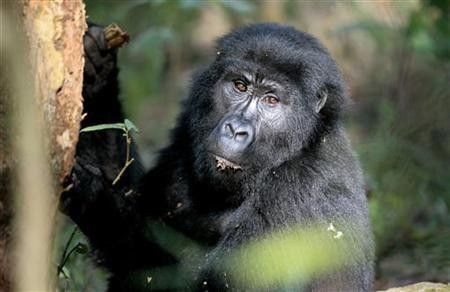Who's Behind The Trafficking Of 3,000 Great Apes? Organized Crime, UN Says

The Great Apes are disappearing. Stolen from their homes in the forests of Africa and Southeast Asia, every year more than 3,000 chimpanzees, bonobos, gorillas and orangutans fall victim to traffickers and organized crime networks, according to a new report from the U.N. Environmental Programme, the Norwegian branch of the Global Resource Information Database, or GRID, and the Great Apes Survival Partnership, or Grasp.
That means that, since 2005, 22,218 great apes have been lost from the wild, the report said. Those who are not killed during poaching or don’t die in captivity are sold. More than 14,200 of those apes were chimpanzees.
"The taking of great apes from the wild is not new; it has gone on for well over a century," Achim Steiner, U.N. Under-Secretary-General and UNEP executive director, said in a statement. "But the current scale outlined in this report underlines how important it is that the international community and the organizations responsible for conserving endangered species remain vigilant, keeping a step ahead of those seeking to profit from such illegal activities."
Who is buying these animals? For the most part, it’s not mainstream zoos, UNEP said. “Trans-national criminal networks supply a range of markets, including the tourist entertainment industry, disreputable zoos and wealthy individuals who want exotic pets as status symbols.
“Great apes are used to attract tourists to entertainment facilities such as amusement parks and circuses. They are even used in tourist photo sessions on Mediterranean beaches and clumsy boxing matches in Asian safari parks,” the report continued.
The report also revealed that demands from zoos have caused a spike in trafficking when the animals cannot be obtained legally. “Standing orders from zoos and private owners in Asia have spurred the export of over 130 chimpanzees and 10 gorillas under falsified permits from Guinea alone, an enterprise that requires a coordinated trading network through Central and West Africa. A safari park in Thailand admitted in 2006 that it acquired at least 54 orangutans from the forests of Borneo and Sumatra,” the report said.
A poacher can make $50 a head for a chimpanzee, and then a middleman can mark the price up to around $20,000. Orangutans go for $1,000 at resale. The Taiping Zoo in Malaysia illegally purchased four baby gorillas for $400,000 each in 2002.
It’s not all the work of traffickers or smugglers either. UNEP said sometimes farmers will capture infants after killing the mother or hunters will kill adults for food and collect and sell the babies. However, what originally started as a by-product of “traditional conservation threats” such as deforestation has turned into an international black market business, involving mafia smuggling similar to how drugs, arms, laundered money and humans are bought and sold.
All great apes are endangered species, protected under the 1973 Convention on International Trade in Endangered Species, or Cites, as Appendix I animals, the UNEP said, meaning that exporting or importing great apes requires government grants and certification and that primates may only be moved if it “will not be detrimental to the survival of that species,” if the animals will be treated well in transit and upon arrival and if they will “not be used for primarily commercial purposes.”
Between 2005 and 20011, only 27 arrests have been made in Africa and Asia in connection with ape trafficking. One-fourth of those never resulted in prosecution, the U.N. and the report said.
© Copyright IBTimes 2025. All rights reserved.





















